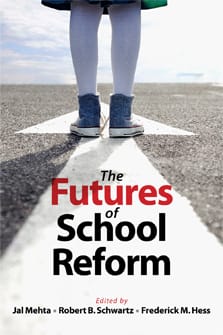 Tony Bryk, Paul Hill, Terry Moe, and Paul Reville (among others) contribute to this wonk-studded volume, which was borne of a four-year Harvard working group and starts from the premise that today’s incremental reforms will not effect lasting change for K–12 education; rather, we must think bigger. To that end, the collection offers six provocative essays. While several extend current reform ideas (moving to a mixed model of government and market-based providers; addressing the disadvantages of poverty through social reform and wrap-around services; copying successful strategies of countries that improved rapidly), others are unique visions for the future. One would professionalize teaching through “network improvement communities” that allow educators to share research, instructional materials, and pedagogical insights across sites. Perhaps the most radical vision for change suggests that education tomorrow will not be synonymous with schooling, as access to knowledge from outside the classroom increases and youth engage in “lifewide” learning. (We would argue, further, that “schools” in the traditional sense might not even be the best vehicle for education delivery in years to come.) Taken together, the essays present a refreshing and forward-thinking design for education reform and reformers.
Tony Bryk, Paul Hill, Terry Moe, and Paul Reville (among others) contribute to this wonk-studded volume, which was borne of a four-year Harvard working group and starts from the premise that today’s incremental reforms will not effect lasting change for K–12 education; rather, we must think bigger. To that end, the collection offers six provocative essays. While several extend current reform ideas (moving to a mixed model of government and market-based providers; addressing the disadvantages of poverty through social reform and wrap-around services; copying successful strategies of countries that improved rapidly), others are unique visions for the future. One would professionalize teaching through “network improvement communities” that allow educators to share research, instructional materials, and pedagogical insights across sites. Perhaps the most radical vision for change suggests that education tomorrow will not be synonymous with schooling, as access to knowledge from outside the classroom increases and youth engage in “lifewide” learning. (We would argue, further, that “schools” in the traditional sense might not even be the best vehicle for education delivery in years to come.) Taken together, the essays present a refreshing and forward-thinking design for education reform and reformers.
SOURCE:
Jal Mehta, Robert B. Schwartz, Frederick M. Hess, eds. The Futures of School Reform (Cambridge, MA: Harvard Education Press, 2012).
